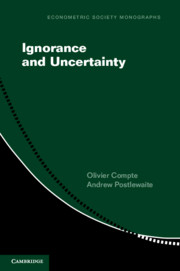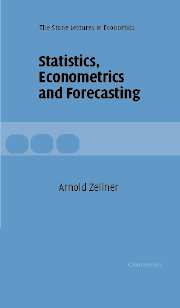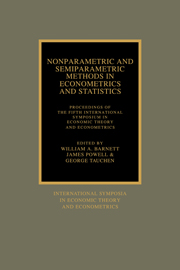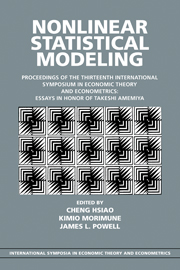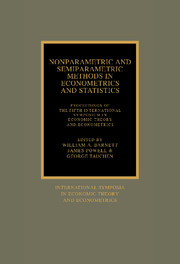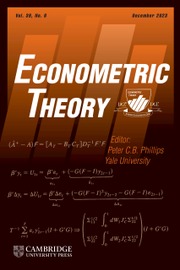Ignorance and Uncertainty
Born of a belief that economic insights should not require much mathematical sophistication, this book proposes novel and parsimonious methods to incorporate ignorance and uncertainty into economic modeling, without complex mathematics. Economics has made great strides over the past several decades in modeling agents' decisions when they are incompletely informed, but many economists believe that there are aspects of these models that are less than satisfactory. Among the concerns are that ignorance is not captured well in most models, that agents' presumed cognitive ability is implausible, and that derived optimal behavior is sometimes driven by the fine details of the model rather than the underlying economics. Compte and Postlewaite lay out a tractable way to address these concerns, and to incorporate plausible limitations on agents' sophistication. A central aspect of the proposed methodology is to restrict the strategies assumed available to agents.
- Proposes a new way to address common concerns regarding the role of ignorance and uncertainty in economic modeling
- Offers insights into sophisticated methods of economic modeling without complicated mathematics
- Combines original research with a review of the literature
Reviews & endorsements
‘This book provides a refreshing and thought-provoking examination of the standard Bayesian foundations of economic analysis. Anyone who reads it will find themselves thinking differently about economic models and economics. The discipline of economics will be all the richer if the book is regularly read and discussed, by economists and others.' Larry Samuelson, A. Douglas Melamed Professor of Economics, Yale University, Connecticut
‘We are in the midst of an era of confusion about what we are trying to accomplish in economic theory. In this book, two insightful economic theorists weigh in on the meaning of economic theory's basic concepts and models. Their comments, even when critical, are given in a spirit of devotion and love for economic theory.' Ariel Rubinstein, Tel Aviv University and New York University
‘This is an important book, by two world-leaders in economic theory. It not only provides new insights into longstanding problems, but will also change the way we think about economic modeling and so change how we develop economic theory in the future.' Paul Klemperer, Edgeworth Professor of Economics, University of Oxford
‘In this brilliant and path-breaking book, Compte and Postlewaite offer a new way of modeling agent reasoning in microeconomic theory, striking a balance between the demands of equilibrium analysis with 'perfect' rationality and the realities of human cognition. They do not focus on a particular anomaly while embracing the rest of the game-theoretical assumptions. Rather, they focus on plausible ways of reasoning for economic agents, allowing a distinction between the agents' and the modeler's world view. In doing so, Compte and Postlewaite provide a new language for modeling bounded rationality.' Itzhak Gilboa, Tel Aviv University and École des hautes études commerciales de Paris
Product details
December 2018Paperback
9781108434492
300 pages
228 × 152 × 17 mm
0.43kg
54 b/w illus.
Available
Table of Contents
- Introduction
- Part I. Modeling Challenges:
- 1. Action space
- 2. Ignorance and uncertainty
- 3. Observations, perceptions and strategies
- 4. Strategies and strategy restrictions
- 5. Knowledge and beliefs
- Part II. Legends and Myths:
- 6. Information aggregation
- 7. Mechanism design
- 8. Surplus extraction
- 9. Folk theorems
- 10. Comparative statics
- Part III. Applications:
- 11. Auctions
- 12. Learning
- 13. Reputation
- 14. Cooperation
- 15. Influence
- 16. Information aggregation in markets
- 17. Bargaining
- 18. Attrition
- 19. Reputation
- 20. Coordination
- 21. Ambiguity and other complexity related aversions
- Miscellanea
- Index.

